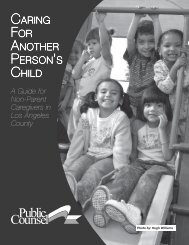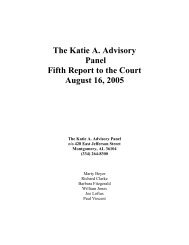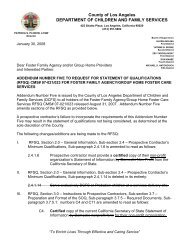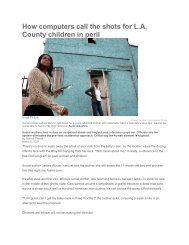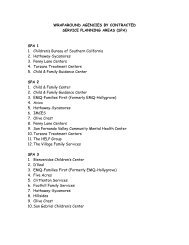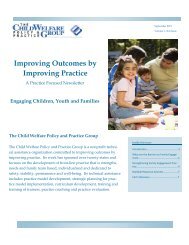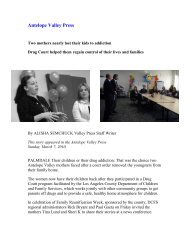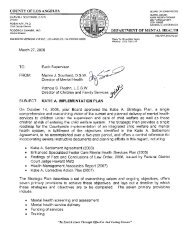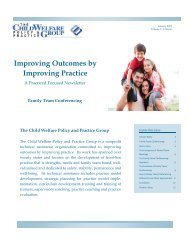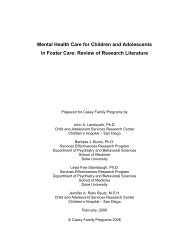Antelope Valley Press - Los Angeles County Department of Children ...
Antelope Valley Press - Los Angeles County Department of Children ...
Antelope Valley Press - Los Angeles County Department of Children ...
Create successful ePaper yourself
Turn your PDF publications into a flip-book with our unique Google optimized e-Paper software.
<strong>Antelope</strong> <strong>Valley</strong> <strong>Press</strong><br />
Two mothers nearly lost their kids to addiction<br />
Drug Court helped them regain control <strong>of</strong> their lives and families<br />
By ALISHA SEMCHUCK <strong>Valley</strong> <strong>Press</strong> Staff Writer<br />
This story appeared in the <strong>Antelope</strong> <strong>Valley</strong> <strong>Press</strong><br />
Sunday, March 7, 2010.<br />
PALMDALE Their children or their drug addiction: That was the choice two<br />
<strong>Antelope</strong> <strong>Valley</strong> mothers faced after a court order removed the youngsters from<br />
their family home.<br />
The women now have their children back after they participated in a Drug<br />
Court program facilitated by the <strong>Los</strong> <strong>Angeles</strong> <strong>County</strong> <strong>Department</strong> <strong>of</strong> <strong>Children</strong><br />
and Family Services, which works jointly with other community groups to get<br />
parents <strong>of</strong>f drugs and to provide a safe, healthy home atmosphere for children.<br />
In celebration <strong>of</strong> Family Reunification Week, sponsored by the county, DCFS<br />
regional administrators Rick Bryant and Paul Gaeta on Friday invited the<br />
mothers Tina Lund and Sheri K to share their stories at a news conference.
"I have three kids. My kids were taken Sept. 15 for marijuana," Lund, 26, said.<br />
"I was smoking weed a lot. When they took my kids, it was a wakeup call."<br />
"As soon as they took them, I started thinking, 'What can I do to get them<br />
back?' That was my main concern. My main objective was to get them back as<br />
soon as possible."<br />
"When my daughter was detained in December '08, I thought there was no<br />
hope," said Sheri, whose last name was withheld. "I did my research when the<br />
(social) worker said I needed to go through a program."<br />
Sheri said at first she opted for the quickest program she could find, but that<br />
didn't help. "I needed to change my people, places and things," she said.<br />
Sheri explained that if she continued to socialize with the same acquaintances<br />
and in the same surroundings, she would remain on drugs. And it struck her<br />
that the "best solution was to go into the Drug Court program."<br />
When Lund entered the Tarzana Treatment Center, which partners with DCFS<br />
in the Drug Court program, she denied smoking marijuana. But, after a month,<br />
she began feeling guilty and admitted her drug use.<br />
Her eyes sparkle when she looks at her three daughters the eldest girl is 5 years<br />
old and her fraternal twins are 1½.<br />
Lund's case closed successfully in November, according to Nancy Ramirez, her<br />
social worker at the DCFS <strong>of</strong>fice in Lancaster.<br />
"When Tina started (the program), not only was there drug abuse in the home,<br />
she was confused, she was codependent," said Ramirez, the first social worker<br />
in the Drug Court program when it began in 2007. "I saw Tina evolve in many<br />
dimensions."<br />
"Right now, I'm going to school to be a social worker," Lund said. "Nancy<br />
changed my perspective from being a cook to (becoming) a social worker. I<br />
want to do what she does."<br />
Although Sheri is still in treatment three days a week, she enjoys every moment<br />
<strong>of</strong> interaction with her 3½yearold daughter.<br />
Sheri said she had certain expectations when she began the program.
"I wanted them to know who I was as a person, and not just another case. The<br />
workers get to know us and how we're doing with our children," she said.<br />
At the Drug Court sessions, Sheri said, "we get to be personal with the judge.<br />
She's a great judge."<br />
"I did six months residential, then went into day treatment for six months."<br />
After that, Sheri said she moved up to Sober Living, a halfway house owned<br />
and operated by Tarzana and used as a transition period.<br />
Sheri said she views all the program team members as family.<br />
"It makes you feel really good. You have family with everybody. To be<br />
connected that much in our society today is great because who has that much<br />
family?"<br />
Sheri said she has taken some college courses, so when she finishes the<br />
program she plans to return and finish her education, pursuing a degree in child<br />
development.<br />
Paola Romo, a social worker at the DCFS Palmdale <strong>of</strong>fice, had been assigned<br />
to Sheri's case.<br />
"I screened her in April '09. She met the criteria. Between May and September,<br />
she did an awesome job.<br />
"In September '09 she completed the residential part <strong>of</strong> the program. She started<br />
the outpatient (phase) in September." Romo said Sheri is about ready to<br />
graduate from the program.<br />
Lund said being admitted to the drug rehabilitation program was "a blessing in<br />
disguise. Everybody was working together," she said <strong>of</strong> the team <strong>of</strong> social<br />
workers, drug counselors, court <strong>of</strong>ficials and others involved in the treatment<br />
process. "I've never seen so much cooperation for one person."<br />
"The hard work comes down to the family itself," said Bryant, regional<br />
administrator at the Palmdale <strong>of</strong>fice.<br />
"The reason we bring you here today is, throughout the county, various (DCFS)<br />
<strong>of</strong>fices are celebrating Family Reunification Week," Bryant told the crowd,<br />
which included staff members from his agency, representatives from Tarzana<br />
Treatment Center, the court system and other social service agencies.
Each <strong>of</strong> the other DCFS <strong>of</strong>fices in the county highlighted a different family<br />
assistance program such as Parents in Partnership, Family Preservation and<br />
Linkages, he noted.<br />
Bryant said Palmdale and Lancaster <strong>of</strong>fice administrators wanted to highlight<br />
the method that makes the Drug Court program successful. He credited Gaeta<br />
with conducting the pilot test on that program.<br />
"We have a unique opportunity with the Drug Court," Gaeta said. "We're the<br />
only area that has its own dependency court here in Lancaster."<br />
Because <strong>of</strong> the hardship for families to make the trip to Monterey Park, where<br />
the other dependency court is located, the regional administrators in the<br />
<strong>Antelope</strong> <strong>Valley</strong> appealed to county 5th District Supervisor Michael D.<br />
Antonovich to situate a dependency court in Lancaster. Gaeta said that<br />
provided the perfect opportunity to implement a Drug Court program.<br />
"This program illustrates how the department has progressed throughout the<br />
years," Gaeta said.<br />
Trish Ploehn, director <strong>of</strong> the <strong>Department</strong> <strong>of</strong> <strong>Children</strong> and Family Services,<br />
couldn't attend Friday's event, but Bryant read a statement from her.<br />
"We firmly believe that every child has the right to grow up in a safe, healthy,<br />
loving and permanent home ... therefore, our highest priority is to ensure that<br />
families are supported with adequate resources to care for their own children,"<br />
Ploehn wrote. "Foster care is a valuable alternative for children requiring a<br />
temporary safe haven; it is not a longterm solution. We know that the longer<br />
children stay in foster care, the more likely they are to do poorly in school,<br />
experience homelessness and mental health issues."<br />
Gaeta read a statement from Referee Marilyn Mordetzky, who hears all the<br />
<strong>Antelope</strong> <strong>Valley</strong> cases for the Drug Court program, which began roughly two<br />
years ago in Lancaster.<br />
"The Drug Court provides a process by which the parents are able to<br />
demonstrate their progress in their drug treatment program to the court on a<br />
frequent and consistent basis," the judge wrote. "This frequent and consistent<br />
contact with the parents ... allows the court to monitor their progress so that the<br />
children may be safely reunited with their parents who have demonstrated they<br />
can maintain a drugfree lifestyle."
Social workers for the department screen three to four families a week, said<br />
Rochelle Montgomery, a supervisor in the Palmdale <strong>of</strong>fice.<br />
"We want to make sure the family wants to participate. It's a very intense<br />
process," she noted, in reference to the rehabilitation treatment.<br />
Navid Daee <strong>of</strong> the Tarzana Treatment Center said from the treatment point <strong>of</strong><br />
view, they assess the statistics to determine success.<br />
Last year, the staff at Tarzana saw a 60% rate <strong>of</strong> success among all their clients.<br />
But separating out those who participated in the Drug Court program, that<br />
success rate reached 90%.<br />
Many factors enter into the equation for success. But one key point, Daee<br />
emphasized, is the fact that the Drug Court program participants can freely<br />
discuss anything with the Tarzana counselors, including their setbacks.<br />
"We are relaxed and nonjudgmental, so they feel free to come to us and be<br />
honest," Daee said.<br />
"The most important thing," Ramirez said, "I have not had one client return to<br />
the system."<br />
asemchuck@avpress.com<br />
Caption: love over drugs Tina Lund, left, shares her story with members <strong>of</strong> the<br />
<strong>Department</strong> <strong>of</strong> <strong>Children</strong> and Family services as part <strong>of</strong> Family Reunification<br />
Week on Friday afternoon. Lund has successfully completed the Drug Court<br />
program. TROY HARVEY <strong>Valley</strong> <strong>Press</strong>



